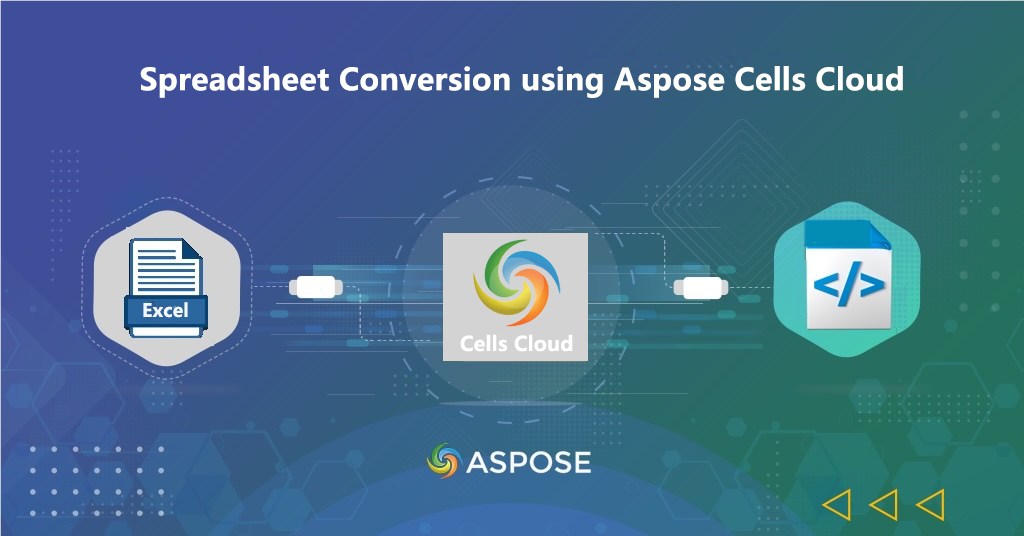Introduction
In modern application development, document format conversion is a common yet complex requirement. Traditional solutions often suffer from feature bloat and complex interfaces, increasing integration difficulty for developers. Cells Cloud 4.0 addresses this by redesigning its Conversion functionality with minimalist API design and single-purpose focus, enabling developers to achieve seamless document format conversion effortlessly. This article details this innovative feature and demonstrates how to quickly integrate it into your applications with low-code approach.
Core Features: Cells Cloud 4.0 Conversion
- Single-Purpose Focus: Specialized in document conversion without unrelated features, ensuring optimal performance
- Minimalist API Design: Typically requires only 2-3 parameters per call, reducing learning curve
- Comprehensive Format Support: Mutual conversion between Excel, CSV, PDF, HTML and other common formats to meet diverse needs
- Low-Code Integration: Complete functionality with just a few lines of code, significantly improving development efficiency
- Cloud/Local Support: Seamlessly handles both local and cloud-stored documents, compatible with major cloud storage platforms
Key Functionality Showcase
The code for the key scenes is written in Python, but SDKs for other development languages can also be used. Such as .Net Examples, Java Examples, Node.js Examples and more.
1. Convert Excel to PDF
# Convert the EmployeeSalesSummary.xlsx file to Pdf format.
instance = CellsApi(os.getenv('CellsCloudClientId'), os.getenv('CellsCloudClientSecret'))
instance.convert_spreadsheet(ConvertSpreadsheetRequest( 'EmployeeSalesSummary.xlsx', 'pdf') , local_outpath = "EmployeeSalesSummary.pdf")
2. Convert Worksheet to PDF
# Convert the "Sales" worksheet in the "EmployeeSalesSummary.xlsx" file to Pdf format.
instance = CellsApi(os.getenv('CellsCloudClientId'), os.getenv('CellsCloudClientSecret'))
instance.convert_worksheet_to_image(
ConvertWorksheetToImageRequest(EmployeeSalesSummaryXlsx, "Sales"),
local_outpath="EmployeeSalesSummary_Sales.pdf")
3. Convert Worksheet to Image (Supports SVG/PNG/TIFF/JPG etc.)
# Convert the "Sales" worksheet in the "EmployeeSalesSummary.xlsx" file to PNG format.
instance = CellsApi(os.getenv('CellsCloudClientId'), os.getenv('CellsCloudClientSecret'))
instance.convert_worksheet_to_image(
ConvertWorksheetToImageRequest(EmployeeSalesSummaryXlsx, "Sales", format="png"),
local_outpath="EmployeeSalesSummary_Sales.png")
4. Convert Worksheet Table to JSON
# Convert "Table1" in the "EmployeeSalesSummary.xlsx" file to Json format.
instance = CellsApi(os.getenv('CellsCloudClientId'), os.getenv('CellsCloudClientSecret'))
instance.convert_table_to_json(
ConvertTableToJsonRequest(EmployeeSalesSummaryXlsx, "Sales", "Table1"),
local_outpath="EmployeeSalesSummary_Sales_Table.json")
5. Convert Worksheet Table to HTML
# Convert "Table1" in the "EmployeeSalesSummary.xlsx" file to HTML format.
instance = CellsApi(os.getenv('CellsCloudClientId'), os.getenv('CellsCloudClientSecret'))
instance.convert_table_to_html(
ConvertTableToHtmlRequest(EmployeeSalesSummaryXlsx, "Sales", "Table1"),
local_outpath="EmployeeSalesSummary_Sales_Table.html")
6. Convert Worksheet Range to JSON
# Convert the "B5:L36" range in the "EmployeeSalesSummary.xlsx" file to Json format.
instance = CellsApi(os.getenv('CellsCloudClientId'), os.getenv('CellsCloudClientSecret'))
instance.convert_range_to_json(
ConvertRangeToJsonRequest(EmployeeSalesSummaryXlsx, "Sales", "B5:L36"),
local_outpath="EmployeeSalesSummary_Sales_area.json")
Multi-Source Support
Cells Cloud 4.0 not only processes local spreadsheet files but also seamlessly integrates with cloud storage. Through integration with Aspose Cloud Storage, it supports various platforms including Amazon S3, Azure Blob Storage, Google Cloud Storage, and Dropbox.
1. Export Cloud File as CSV
# Convert the "EmployeeSalesSummary.xlsx" file stored on Aspose Cloud Storage to CSV format.
instance = CellsApi(os.getenv('CellsCloudClientId'), os.getenv('CellsCloudClientSecret'))
instance.export_Spreadsheet_as_format(
ExportSpreadsheetAsFormatRequest(EmployeeSalesSummaryXlsx, "csv", folder="PythonSDK"),
local_outpath="EmployeeSalesSummary.csv")
SDKs Guide: Installing and Using Aspose.Cells Cloud SDKs
Streamline your development workflow with our multi-language SDKs for seamless Excel/spreadsheet automation. Get started in minutes with these battle-tested installation methods.
Comprehensive SDK Installation Matrix
| Language | Package Manager | Installation Command | Documentation Link |
|---|---|---|---|
| .NET | NuGet | dotnet add package Aspose.Cells-Cloud |
.NET SDK Quick Start |
| Java | Maven | mvn repository: https://repository.aspose.cloud/repo/ |
Java SDK Quick Start |
| Python | pip | pip install asposecellscloud |
Python SDK Quick Start |
| Node.js | npm | npm i asposecellscloud |
Node.js SDK Quick Start |
| PHP | Composer | composer require aspose/cells-sdk-php |
PHP SDK Quick Start |
| Go | Go Modules | go install github.com/aspose-cells-cloud/aspose-cells-cloud-go/v25@latest |
GoLang SDK Quick Start |
| Ruby | RubyGems | gem install aspose_cells_cloud |
Ruby SDK Quick Start |
| Perl | CPAN | cpanm AsposeCellsCloud::CellsApi |
Perl SDK Quick Start |
Conclusion
With its new document conversion feature, Aspose.Cells Cloud 4.0 delivers a simple, efficient, and developer-friendly solution for converting document formats. By embracing a minimalist API design and focusing on single-purpose functionality, it enables low-code integration and allows developers to perform format conversions in just a few lines of code.
Combined with support for both local and cloud-based documents, and seamless integration with multi-language SDKs, Cells Cloud 4.0 is the ideal tool for modern document processing workflows.
FAQ
- Q1: Which file formats are supported for conversion in Cells Cloud 4.0?
A: Cells Cloud 4.0 supports mutual conversion between Excel (XLSX/XLS), CSV, PDF, HTML, JSON, and image formats such as PNG, JPG, TIFF, and SVG.
- Q2: Does it support both cloud and local files?
A: Yes, Cells Cloud 4.0 supports conversion of both local files and files stored in cloud platforms such as Amazon S3, Azure Blob Storage, Google Cloud Storage, and Dropbox.
- Q3: Is complex configuration or a steep learning curve required?
A: No. Cells Cloud 4.0 uses a minimalist API design — most operations require only 2–3 parameters — significantly lowering the learning curve for developers.
- Q4: Will the original formatting be affected during conversion?
A: No. The conversion process preserves the original document’s styles, formulas, charts, and formatting to ensure output fidelity.
- Q5: Is there a free trial plan available?
A: Yes, Aspose.Cells Cloud offers a free plan with a limited number of API calls for testing and development purposes.
